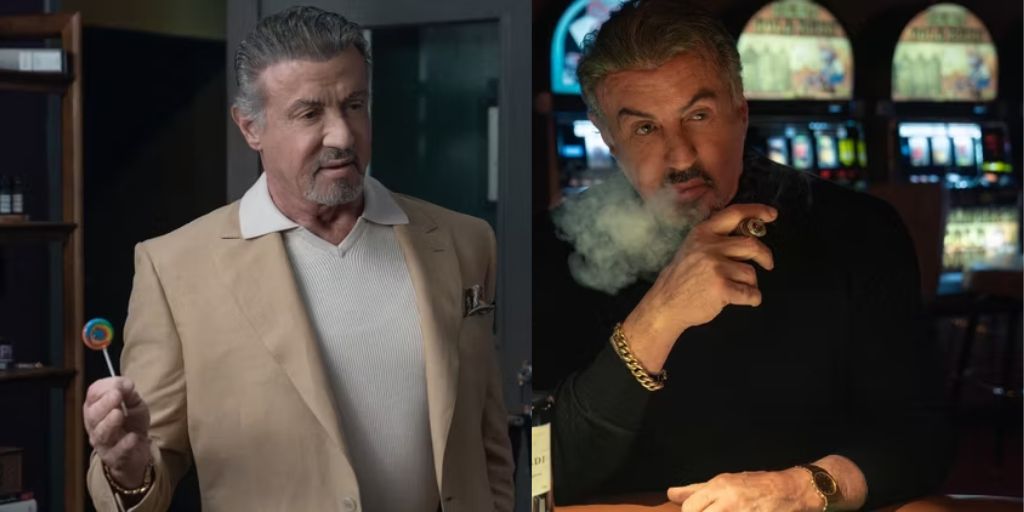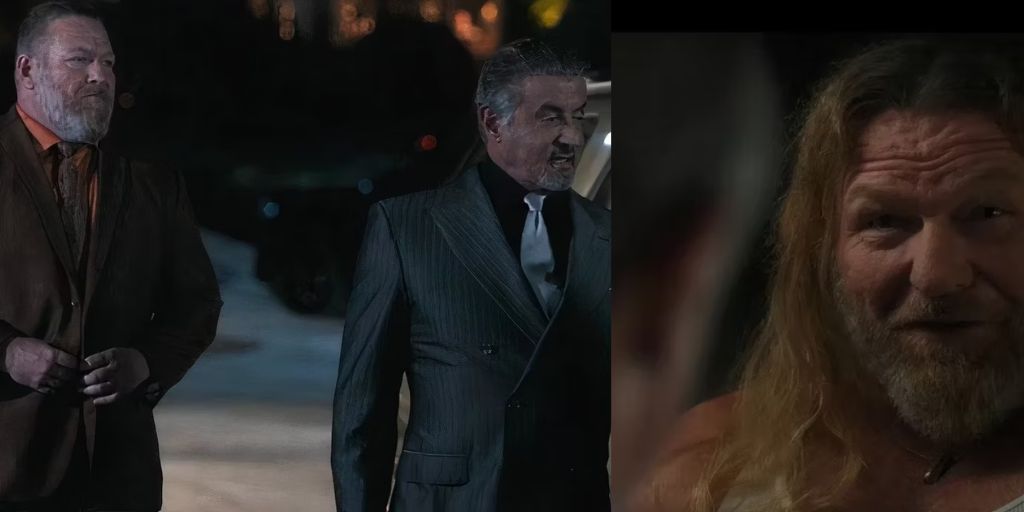In Tulsa King’s Season 2, Episode 8, titled “Under New Management,” shifts in leadership, loyalty, and life-altering choices take center stage.
The episode starts with a major shift in power among the families, businesses, and even unexpected characters, taking the show in bold new directions and causing devastating chain reactions.
This episode highlights the raw consequences of bad decisions in a tense, high-stakes environment. As familiar characters face unexpected turns, every scene piles on the tension, foreshadowing much darker days ahead.
Chaos in the Invernizzi Family and Beyond
The episode is packed with scenes showing the fallout from the previous gang conflicts, centering around a brutal shootout that altered the trajectory of everyone involved.
The main groups affected include the Invernizzi family, Thresher’s crew, and a few outlying figures in the Tulsa underworld. A lot of characters are facing losses that bring out extreme actions, creating an atmosphere of panic and volatility.
One of the major plot points involves Bill Bevilaqua’s capo, who was shot by Tyson in the prior episode but survived. While the injury wasn’t fatal, the action stirs tension with Kansas City.
It also leads to more significant repercussions, as Dwight and the Invernizzi family find themselves caught in a collision of competing motivations and betrayals.
Meanwhile, Jackie, once a minor figure, seizes the opportunity to push his agenda and emerge as a key player in the ongoing gang wars.
In the heart of this storm, somewhat surprisingly, stands Armand, whose journey takes on a central focus.
Armand’s Descent into Desperation
Armand’s story is especially poignant in “Under New Management.” Previously a side character with little depth, Armand is now at the forefront, representing how desperation can drive even well-meaning people to take extreme steps.
Armand started as a comic relief figure with a weakness for drink, but Season 2 gives him a complex and troubled arc, showing how misplaced loyalty and poor decisions can lead to severe consequences. His initial interactions with Thresher showed how easily he can be manipulated.
Thresher gains insight into Dwight’s movements through Armand, who initially shares information unknowingly and later under pressure. These actions set off a chain of events that spiral out of Armand’s control, leaving him isolated and vulnerable.
By this episode, Armand is pushed to the edge. He finds himself without allies, as Dwight no longer trusts him, Thresher discards him, and even his own family grows distant.

His desperation leads him to consider the FBI’s witness protection program, knowing it would cut him off from his family, who are planning to move to Colorado without him. Armand’s drinking spirals out of control as he lashes out, making a series of impulsive decisions that only worsen his situation.
The climax of his arc in this episode is an ill-fated attempt to rob Dwight’s stash, leaving a tragic final voicemail for his family and taking Goodie hostage.
The Sad Complexity of Armand’s Character
Armand’s story is compelling because he’s not inherently malicious. His motivations come from a place of fear and survival rather than malice. This vulnerability makes his actions all the more heartbreaking as we witness him unravel.
His choices don’t reflect a true criminal mindset, yet his circumstances drag him into a life that demands ruthless behavior. His moral struggles and emotional outbursts show the viewer how even minor players in this world are caught in a system that punishes any missteps.
By the episode’s end, Armand becomes a tragic figure, setting him up as a cautionary tale and perhaps foreshadowing a fateful encounter with Dwight.
Vince Challenges Chickie for Control
Meanwhile, Tulsa King’s overarching story heats up with Vince finally challenging Chickie’s leadership in the Invernizzi family. This pivotal scene demonstrates a major shift in power dynamics. Vince bluntly informs Chickie that he’s been replaced as head of the family.
Chickie’s reaction is predictable, and his grudge against Dwight resurfaces. Chickie’s intense hatred for Dwight began when he was exiled to Tulsa, where his growing influence posed a challenge to the New York families. This resentment turns into a dangerous obsession, especially now that he’s no longer in power.
Despite his diminished authority, Chickie is not the type to give up easily. His scheming mind immediately begins to consider how he can regain influence, and it’s clear that Dwight’s family might become a target.
Chickie’s character contrasts with Armand’s; he is consistently selfish, spiteful, and willing to harm anyone in his way. Vince’s decision to strip Chickie of his power, while strategic, may backfire since leaving Chickie alive allows him to plot further chaos.
Vince’s takeover represents more than just a power move—it sets off a new cycle of revenge that could destabilize the entire crime network.
This development lays the groundwork for what could be an explosive showdown in future episodes, especially as Chickie contemplates targeting Dwight’s loved ones to force his hand.
Jackie’s Surprising Move and the Escalation of Gang Tensions
Another interesting twist in Episode 8 is Jackie’s calculated rise. He has managed to operate under the radar, and while Thresher’s arrogance made him dismiss Jackie as a threat, Jackie’s patience pays off in this episode.
Thresher’s assumption that Jackie’s financial inferiority meant submission was a grave error. Jackie uses Thresher’s oversight to his advantage, gradually positioning himself as a formidable player.
With access to resources and a loyal following, Jackie’s ambitions are now evident. His takeover of the weed operation is just the beginning; he’s eyeing Kansas City next, a target that would cement his control.
Thresher’s warning to Bill about Jackie is poignant, painting Jackie as more than just another ambitious gangster—he’s reckless, dangerous, and unafraid of confrontation.
Thresher admits that Jackie was behind a car bomb aimed at Tyson’s father, Mark, sparking an unnecessary conflict that now threatens all involved parties. Bill’s frustration is palpable, as he realizes he’s been drawn into a needless war with Kansas City and that the conflict has cost lives.
This storyline is a commentary on how ego and underestimation of others can lead to destructive outcomes. Jackie’s expansionist approach is more than a power grab; it disrupts the carefully constructed balance among the gangs and sets a brutal tone for the future.
With the car bomb incident, Jackie has crossed a line that could unleash retribution from multiple fronts. His brazenness adds fuel to an already volatile situation, ensuring that his role in future episodes will be impactful.
The First Strike in an All-Out Gang War
The final act of the episode signals a new phase in the gang conflict. Dwight, aware of the growing threats, has taken measures to protect his family by sending Tina and the kids away and shutting down his businesses.
His cautious approach reflects the calculated risk management typical of his character, but even Dwight can’t cover all his bases.
The turning point comes when Bill decides to act on the simmering tensions. Despite the tentative truce between Kansas City and Dwight after the Atlanta sit-down, the recent events undo this fragile peace. Tyson’s attack on Bill’s capo had been more of a warning, but it wasn’t a formal declaration of war.
That changes when Bill retaliates, marking the beginning of open hostilities between the two sides. The attack on Even Higher Plane, Dwight’s dispensary, leaves Jimmy the Creek dead, setting a dark tone for the bloodshed to come.

Jimmy’s death might seem low-stakes, but it foreshadows a larger battle. As Bill’s men begin targeting Dwight’s crew, the episode makes it clear that Dwight’s peaceful intentions won’t prevent further losses.
The federal agents monitoring Bill reveal that they had overheard a hit being planned, highlighting the inevitable collision between Dwight’s crew and Kansas City. This federal intervention adds a new layer to the conflict, as law enforcement watches and waits for the gangs to weaken each other.
Dwight’s Dilemma and the Fallout to Come
The closing scenes of Episode 8 show Dwight’s vulnerability and the sacrifices he must make to protect his people. He is a hardened character, yet his concern for his family drives him to preemptive action, such as sending them away.
His survival instincts and connections keep him one step ahead, but even Dwight’s best efforts can’t fully prevent the encroaching danger. The FBI’s wiretap alert gives him some advantage, but it also indicates that he’s now firmly under federal scrutiny.
As he braces for the unfolding conflict, Dwight finds himself at a crossroads. His loyalty to his crew is unwavering, but the stakes are growing higher with each episode. The death of Jimmy signals the cost of this war, which is now unavoidable.
With Kansas City escalating tensions and the Invernizzi family in disarray, Dwight’s journey seems destined for greater turmoil. His decisions will likely define the future of Tulsa King, especially as he balances protecting his people against facing his enemies head-on.

Episode 8 of Tulsa King Season 2 is a masterclass in building suspense, setting the stage for dramatic confrontations.
It shows the themes of power, betrayal, and survival in a ruthless criminal underworld. Each character, from Armand to Dwight, faces challenges that test their resolve and loyalty, with disastrous consequences.
The episode’s ending leaves viewers on edge, with many questions unanswered and the fate of several characters hanging in the balance.
With gang wars looming, future episodes promise to deliver high-stakes drama and shifting alliances as the battle for control reaches new heights.





